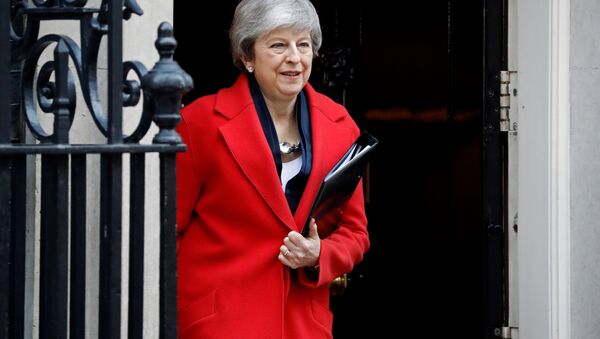Theresa May has narrowly escaped the threat of a challenge to her position as Conservative leader until at least December.
With senior MPs on the backbench 1922 Committee rejecting calls for changes to Party rules allowing for a no-confidence vote in the Prime Minister in the coming weeks, Theresa May can breathe a sigh of relief.
Nonetheless, May is expected to provide the Committee with "clarity" and a timeline regarding her plans to remain PM if her EU Withdrawal Agreement fails.
.@Theresa_May plans to give MPs a vote on her #Brexit deal as early as next week 🇪🇺🗳️ https://t.co/mS0bhbwskn
— Sky News (@SkyNews) April 25, 2019
Amid heightened pressure for the Prime Minister to set the date of her departure, officers of the 1922 Committee executive met in Westminster, and ultimately decided against introducing a change to the rule which grants the leader a 12-month grace period following a no-confidence vote, during which they cannot be challenged again.
Chairman Sir Graham of the 1922 Committee told Sky News: "After looking at it at length, the executive's very clear view was that this would not be an appropriate thing to do."
"We will communicate to the Prime Minister our request for a clear timetable to be set for her departure as leader of the Conservative party."
Sir Graham added they would need to wait for May’s response, adding she must also reveal when she plans to leave if her deal is defeated yet again.
READ MORE: UK PM May Answers Questions From MPs in the House of Commons (VIDEO)
The embattled PM saw off a bid to remove her by a margin of 200-117 in a Tory MP vote on 12 December 2018.
Critics of her handling of Brexit had called for the grace period to be reduced to six months, allowing for a second confidence vote to be conducted in June.
Wednesday's decision means the PM remains safe for now. However, impatience among her critics is growing.
Originally, the UK was due to finalise its exit from the bloc on 29 March. However, May's government failed to secure support for its withdrawal agreement before the deadline, prompting London to seek an extension to avoid a no-deal scenario.
After the 10 April European Council special meeting, London received a flexible Brexit extension until 31 October.


